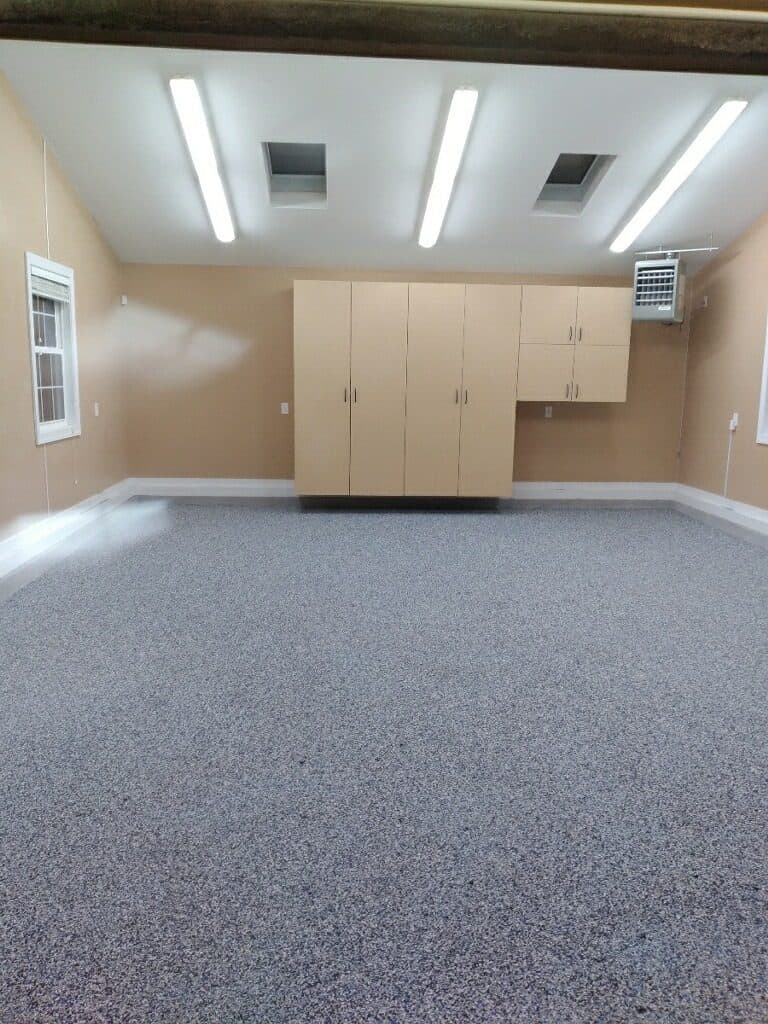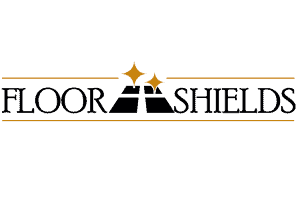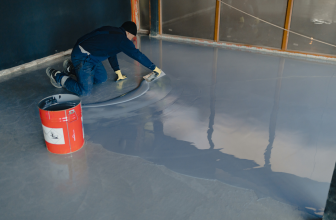Garage Floor Paint Vs Epoxy Coatings: What’s The Difference?
Epoxy floor coatings and concrete paint, what’s the difference?
If you’re considering coating a concrete floor, you’ve probably come across concrete paint products for garages and epoxy coating products, and some that are called epoxy paint. This can get confusing because it’s difficult to know what option is going to be best for your floors.
Paint, epoxy paint, and epoxy coatings all have different costs associated with them and levels of durability. We’ve been doing epoxy floors for years and the difference between concrete paint and epoxy coatings is huge.
The breakdown is very simple but because of marketing trends and consumer packaging, the differences have become mixed together. Garage floor paint is really just paint. It will peel and won’t last as long as you want it to. On the upside, it’s cheap and easy to install. Epoxy coating is a pure epoxy that has extensive durability, aesthetic appeal and tons of benefits. Then there’s epoxy paint. This is essentially a mixture between the two.
Read on for a detailed guide so you can decide on the right product for your next concrete project.


The good thing is, you can use your common sense to figure out the best fit for your needs. Epoxy paint is the cheapest, and easiest to install, and also the worst in terms of durability. Epoxy paint is middle of the road depending on how much paint is in the product vs epoxy. epoxy coating should be a 100% solid epoxy and the best and most durable garage flooring system. It’s also the most expensive and hardest to install properly.
Many homeowners, DIY enthusiasts, and contractors have started applying epoxy paint and epoxy coatings..
The main difference between epoxy paint and normal paint is that when epoxy is mixed into the acrylic paint, it makes the paint thicker and allows it will bond to the concrete paint and adhere for a much longer period of time. Regular paint applied on top of a concrete slab has a tendency to peel and flake over time as present, the paint will adhere to the concrete surface much better, making it more durable. Without epoxy, a standard acrylic paint has a tendency to peel and flake, because the bond to the concrete isn’t enhanced by the epoxy additive.
Benefits of Epoxy Coating Over Garage Floor Paint
Epoxy coating is better in almost every way over garage floor paint. The only issue is that epoxy is 100% non-porous which means it’s more difficult to apply and it’s also more expensive. Big box stores try and make them sound like they are the same but really they aren’t. There are pro’s and cons to each.
Epoxy coating is made up of 1 part epoxy resin and 1 part polyamine hardener. The two parts are mixed together prior to installation in a small time window and a temperature controlled environment. You can then add colored pigments and it will cure over a 24 hour window of time. It doesn’t dry like a normal garage floor paint.
Aesthetic Appeal
You can add different color pigments and flakes to epoxy essentially customizing them to look however you want. They can even be made to look like 3d floor or metallic floors.
Durable
Epoxy coatings are extremely durable and basically will last as long as the concrete is there and have the capability to outlast a lifetime if the garage floor is prepped correctly for the epoxy.
What Is Garage Floor Paint?
Garage floor paint and epoxy paint were created as a cost-effective solution for concrete floors in industrial settings. Epoxy paint, as it sounds is a a latex acrylic paint mixed with epoxy. Epoxy paint is more durable than regular paint because of the epoxy chemical properties added to it. It’s a tough durable, protective floor coating that is fairly easy to maintain and is corrosion resistant. Because of these characteristics, epoxy paint has become a product of choice for DIY basement floors, garage floors and still some warehouse floors.
How much epoxy is in the floor paint?
Epoxy floor paint is made up of two or three components, A true epoxy is 100% solids epoxy. If it is less than 100% solids epoxy, you know right away that paint is mixed with the epoxy and there is an acrylic instead of epoxy in the mixture. With epoxies that are less than 100% solid epoxy, whatever percentage is lower than 100% is the amount of paint that has been added to the epoxy and is not as strong and can evaporate, yellow or peel when it doesn’t bond as hard to the concrete during the curing process. Water based epoxy paints can dissolve during the curing process.
Here’s an example: If the epoxy is 50% solids it means that 50% of the coating could evaporate dry or condense over time. The lower the percentage of epoxy the lower the quality of the material (as a reference).
So why do people use epoxy floor paint if it isn’t as good? Simple. It’s easier and cheaper. There is nothing wrong with epoxy paint as long as you know what you are getting. The floor is not as durable as a full 100% solids epoxy and you can do it yourself without hiring a contractor. For a full review of the best epoxy garage floor coatings, you can reference our guide.
Cost of epoxy paint vs regular paint
As you might have guessed, epoxy paint is more expensive than regular floor paint. The reason is that the epoxy additive is more expensive and has components not regularly found in paint. A regular epoxy paint kit for a two car garage (400 sq ft. is usually between $200 and $300) which contains two layers of coating, a primer coat and a top coat. This is about 30% more expensive than regular paint.
Epoxy Paint Vs Epoxy Coating
As we discussed above, epoxy paint is a latex acrylic paint mixed with epoxy. A true epoxy coating is 100% solid epoxy. 100% solids epoxy means that the product is much more durable. It’s also more expensive and can be more difficult to install. 100% solids epoxy is usually only installed by a certified epoxy installer. As far as a homeowner should be concerned, if you want a floor that is truly going to stand up to anything, including hot tires, some oil spills and pretty much anything you throw at it, short of a kitchen sink, you’ll want an epoxy coating. If you want a great product that is a little more cost effective that you can apply yourself and won’t break the bank, an epoxy paint will work fine for you. Based on the amount of wear and tear you put on your floor, you may haveto re-apply the epoxy paint in 5-10 years. Hiring a professional epoxy floor installer that that uses 100% epoxy coating and does full surface preparation of a garage floor for epoxy coating. It’s as simple as that!
What is in an epoxy floor coating that makes it more durable than paint?
Epoxy is made up of two-component materials, one part epoxy resin, and one part polyamide hardener. You will need to mix the two parts together before application. When you mix the two parts, you are limited by time and temperature to how long you have to apply. When it comes to colored epoxy, the tinted resin gives the epoxy its color. The resin is clear if it gives a clear coating.
That is paint and epoxy resin and a polyamine hardener. The two need to be mixed together immediately before application. When the two are mixed an exothermic chemical reaction happens during the curing process. The coatings cure process will produce polymer structures that are closely cross-linked, and this will give the floor epoxy its superior strength and durability.
The floor epoxy coating reaction will cure instead of drying. This will benefit a concrete floor because the process seals the porous concrete, while the resin gives the floor a shine. Epoxy coating is more resistant to chemicals and abrasion than an ordinary paint-on application. It is also impact resistant and hard and durable. making it perfect for a garage floor coating. This means that it will not fracture, crack, or split if heavy loads are dropped on it. This includes equipment and machinery being driven over the surface. Epoxy can also have two coats and if it gets sanded, you can apply an epoxy coating to cured epoxy so it’s more durable.
Epoxy Coating Curing and Bonding Process
Epoxy coatings will cure, but not dry like the paint does. The performance and amount of resistance of the coating are determined by the quality and solids constituents of the epoxy. The thickness of the epoxy and its ease of application will be dependent on the volume of solids content. This is displayed as a percentage. What this means is that 100% solids epoxy will have a 100% of the product on the floor as it cures. While 50% of solids will have 50% of the product remaining on the floor after it’s curing process. The reason behind this is that the carrier agents (solvents and water) which are in use in the lower solids products will evaporate out during the curing process. An example is when 100% solids epoxy is applied with a roller and will have an approximate wet film thickness (WFT)of 10 mils. After its curing process, the dry film thickness will still be 10 mils, while, 50% solids epoxy will have a wet film thickness of about 6 mils but after it cures the coating will reduce to a dry film thickness (DFT) of about 3 mils.
Because of its thicker viscosity and limitation in time to apply, the 100% solids epoxy is a bit harder to work with during its application, while epoxy with a much fewer solids count will have less viscosity and will be much easier to apply.
Many DIY epoxy paint kits available locally and online will have around as 48% solids. This will make it easy to apply, similar to applying paint, As a rule of thumb, the less expensive the epoxy is, the less epoxy solids are in the mixture.

Why did paint and epoxy coatings become so confusing?
Marketing. Like everything, marketing made everything more confusing. Epoxy floor coating and epoxy paints are terms that started to become used interchangeably by different companies. The only way to tell if epoxy is a paint or a true coating is by looking at the technical spec sheet and checking for how much epoxy solids are in the mixture. When you buy epoxy paint to use on your floor as a coating in a home improvement store, you may realize that the two terms used on the can or kit. (You may also find another term, that is epoxy sealant)








